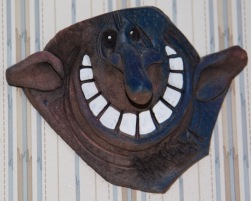
Revisions
Wednesday Workshop
27 June 2018
Below are the texts of a poem that I am attempting to revise. Any comments on the text(s) or the revision process will be welcome.
In Absentia 1
Princess Squiffy
I hear her voice, delicate, distant. I
run to the sound, jump on the table in
my usual spot by her plastic plaything.
She isn’t there. He is and he’s talking.
I can see him, smell him. I hate him, his
other sex perfumes, but there he is and
when he stops talking, I can hear her voice.
I move to his talk box. A shadow, I
can’t quite make it out, then her voice again.
My whiskers stiffen, I lean forward, sniff,
but no smell. She has no smell, and scentless,
I cannot sense her, I bristle, she calls
me by my favorite names, mews, and I mew
back in reply. But I can’t smell her. There’s
no sense of touch … is this the hell all cats
will suffer … shadows on a screen, a voice,
haunting, memories shifting and dancing,
nothing solid … just shadows and absence?
Problems:
Repetition of scents / smells, there, voice (4), plus avoid all cats …
Solutions:
Seems easy to tidy up … but … how do I end the poem with I hate him? Would it make the poem stronger? It would man a total rethink and restructure.
In Absentia 2
Princess Squiffy
I hear her voice, delicate, distant. I
run to the sound, jump on the table in
my usual spot by her plastic plaything.
She isn’t here. He is and he’s talking.
I can see him, smell him. I hate him, his
other sex perfumes. He stops talking. I
can hear her warm, sweet words: where can she be?
I move to his talk box. A shadow, I
can’t quite make it out, then her tones again.
My whiskers stiffen, I lean forward, sniff,
but cannot sense her. I bristle. She calls
me by my favorite names, squeaks, and I mew
back. There’s no sense of touch, of her presence.
Is this the way we all will suffer? Wood
burns. Firelight flickering, shadows on
cave walls, long gone memories revived to
haunt us. Are these the torments held in hell?
Will dark shapes shift on half-lit screens? Will the
memories of loved ones come back to taunt
us, haunt us? Will there be nothing solid
in the afterlife, just outlines and absence?
First Revision:
I quite like it, but it has become much longer and the cat’s voice has either been conflated with the human voice at the end or it’s an exceptionally intelligent cat, knowing all about Plato, unless those can pass as feline memories because she was in the cave with him.
In Absentia 3
Princess Squiffy
I hear your voice, delicate, distant. I
run to the sound, jump on the table in
my usual spot by your plastic plaything.
You are not here. He is. I can hear you
talk. I stalk to his noise box. I see a
shadow, moving, but I can’t make it out.
My muscles first tense, then stiffen. I sniff,
lean forward, but find no trace of female
smell. I cannot sense you. You call me by
my favorite names, mew at me, and I
respond. Shifting shadows, your haunting tones,
memories dancing to the music of
your absence. I can’t eat. I bristle when
he laughs. Where are you, my love? He doesn’t
care for me the way you do. I loathe him.
Second Revision:
This is much shorter, builds up to the proposed new ending, eliminates the repetitions, and replaces hate with loathe, a very catty sound. However, I have lost the ending that I liked so much: the suggestion of Plato’s Cave has now been lost. So, let’s head to Plato’s Cave.
In Absentia 4
Plato’s Cat Cave
Princess Squiffy
I hear her voice, delicate, distant. I
run to the sound, jump on the table in
my usual spot by her plastic plaything.
She isn’t there. He is and he’s talking.
I can see him, smell him. I hate him, his
other sex perfumes, but there he is and
when he stops laughing, I can hear her voice.
I move to his talk box. A shadow, I
can’t quite make it out, then her voice again.
My whiskers stiffen, I lean forward, sniff:
she has no smell. I bottle-brush my tail.
Envoi
by Plato
Firelight flickering, shadows on walls,
distant voices echoing, memories
perched on our shoulders, night owls hooting.
Is this the hell we all will suffer, shapes
shifting on a screen, voices taunting us,
memories dancing to half remembered
melodies, nothing solid, shadows, absence?
Third Revision:
This poem has now changed shape and direction. I quite like it but it is dependent on a knowledge of Plato’s Cave. Does the cat belong in Plato’s Cave … I think of Kipling’s Just So story The Cat that Walked … perhaps it does. Perhaps it doesn’t.
Decision Time:
Playing around with the text was fun. The text moved in several directions and now I must choose my final direction.
Comments on any of the versions or on the revision process I used will be very welcome. And yes, nothing perishes. My poems, like my cats, have nine lives (well, four in this case, with possibly a fifth to come).








